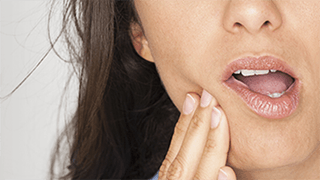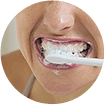Common Triggers for Sensitive Teeth
A range of things can trigger a short sharp pain for people with sensitive teeth. Here are some of the more common triggers for tooth sensitivity:
- Eating cold food or drinking cold drinks
- Eating hot food or drinking hot drinks
- Eating sugary or sour foods
- Breathing in cold air
- Brushing teeth

Other Reasons for tooth pain including Tooth Decay
Here are some other common problems which can cause tooth pain:
Tooth Decay
Pain caused by tooth decay (dental caries) can feel similar to tooth sensitivity. Tooth decay happens when the sugars in foods and drinks react with the bacteria in the plaque on our teeth to form acids. These acids can gradually soften and dissolve your enamel and dentine. Brushing twice a day with fluoride toothpaste will help to strengthen your teeth.
The problem with tooth decay is that you might not feel any pain from it until it’s quite advanced. It can be treated in the early stages. So, even if you don’t feel any pain, it’s important to go for regular dental check ups so that your dentist can spot early signs of tooth decay and work with you to treat it.
Teeth Whitening
Many people experience tooth sensitivity during, and for a period after teeth whitening treatments. By teeth whitening, we mean professional treatments applied under the supervision of a dentist that uses bleaching ingredients.
The sensitivity that can be experienced during and after a bleaching treatment is different from dentinal hypersensitivity. The bleaching component in the product is believed to pass through the enamel and dentine and enter the pulp at the centre of the tooth, where it can cause inflammation and temporary sensitivity.
After Treatment
It is not uncommon for your teeth to feel sensitive for a time after having dental treatment. However, if this persists contact your dentist for advice.
Other common causes of tooth pain include dental abscesses and cracked teeth. It is important to visit your dentist regularly to check the health of your teeth and gums. If you feel and pain or discomfort, particularly if it persists, contact your dentist for advice.

The Sensodyne® Online Check Up
Do you think you may have some of the symptoms of sensitive teeth? Our Online Check Up is useful tool to help you find out more. It only takes few a minutes and you can take it right now.
ABOUT SENSITIVITY






